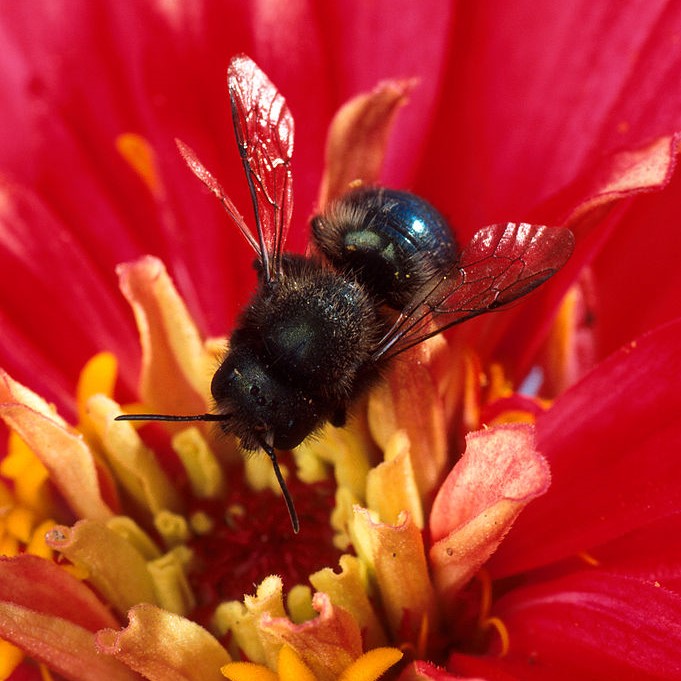
By Ranee Webb, Master Gardener Volunteer
One of the primary fundraisers and education outlets for Linn Master Gardeners is the BEEvent Pollinator Conference. The following is a history of that project and how it has grown and changed.
Our Mission: The primary purpose of the Linn County Master Gardeners Association Pollinator Project is to provide information to the general public about the plight of pollinators, both native and non- natives. We provide knowledge and materials to ordinary citizens to help them make their spaces friendly to pollinators, and so that they can become informed advocates. A secondary, but very important, purpose is to raise funds to support the outreach programs of the Linn County Master Gardeners Association to educate the public in healthy and productive gardening practices.
History:
In 2014, Barbara Fick, then a Linn County Extension agent, was talking to retired entomologist and Master Gardener Volunteer Rich Little about how we could increase the public’s awareness of pollinators. In 2015 the BEEvent Pollinator Conference was established to help home gardeners and small farmers better understand how they could help bees. That first conference had 54 participants. In recent years about 200 participants have registered to hear nationally known speakers and local experts talk about pollinator health. The BEEvent is now the largest pollinator conference in the PNW. Between 60-80% of attendees are new each year, so that means we are reaching a lot of people. Due to the COVID pandemic, the 2021 BEEvent went virtual. That was a new challenge and learning experience for all!
Keynote speakers over the years have included Rich Hatfield, senior conservation biologist of the Xerces Society, Robbin Thorp, distinguished emeritus professor of entomology at the University of California, Davis, Olivia Messinger Carril from New Mexico, co-author of “Bees in Your Backyard,” and James Cane, research entomologist with the USDA Agricultural Research Service in Logan, Utah. Cane has been studying bees for 30 years and is known for having applied his long-term interest in bees to help measure, understand and mitigate human factors that can shift nesting and foraging opportunities for bee communities.
Rich Little has given many presentations about native bees throughout Oregon for Master Gardeners and the public. Each fall Linn Master Gardener instructors meet with small groups to teach how to properly harvest and clean cocoons. Harvesting the cocoons helps ensure a healthier outcome and you learn more about what is inside the nesting sites. During these classes our participants develop an understanding and learn to follow the “Best Management Practices” for Mason Bees. This helps gardeners and small farmers become more successful in helping our native bees.
In 2016 we started an e-mail publication called “Bee Notes”. The purpose of Bee Notes is to share information and reminders to those who have mason bees. We also share articles about pollinators that will help the home gardener be a better steward in helping pollinators. Currently there about 800 subscribers. Rich Little, who has a degree in entomology, writes most of the more technical information. Ranee Webb writes some of the Bee Notes. Our webmaster, Nancy Ragghianti, does the final touches and publishes the Bee Notes. Together we make a team. We are amazed at the success of Bee Notes!
Linn County Master Gardeners were early in starting the use of our own website. You can now find a lot of information including Bee Notes on the website- www.LinnMasterGardeners.com.
Award:
The Oregon Master Gardener Association awarded Linn County Master Gardeners the Marje Luce Search for Excellence Award in 2020.
Proud of Our Successes and Yours:
Our Master Gardener volunteers sell bee supplies and houses as well as mason bee cocoons. In normal years about 50 master gardeners are involved in our pollinator project.
We believe our Master Gardener volunteer’s campaign to promote pollinator health is having a positive effect.
Linn Master Gardeners have worked with the OSU Bee Project, the Benton Soil Water and Conservation District and Shonnard’s Nursery in developing our Pollinator Project and supporting their outreach programs as well. We have had contacts from people out-of-state asking to find out more about how we do the conference in hopes of putting on conferences similar to ours. Awareness of native bees has increased and we like to think we have helped you and many others learn more.
All of these projects happen because at least 50 Linn Master Gardeners and a few Benton Master Gardeners got involved!

